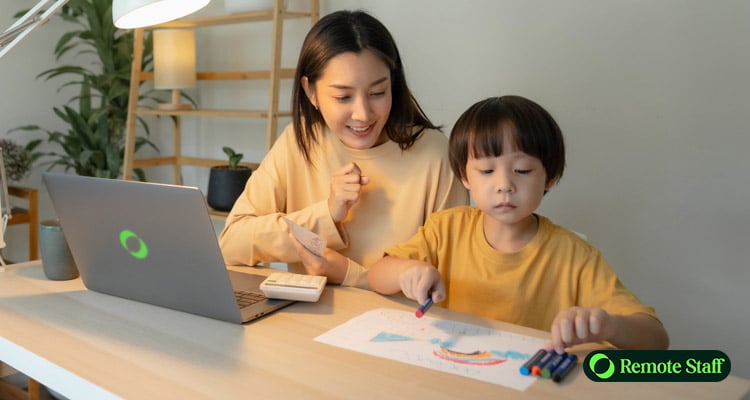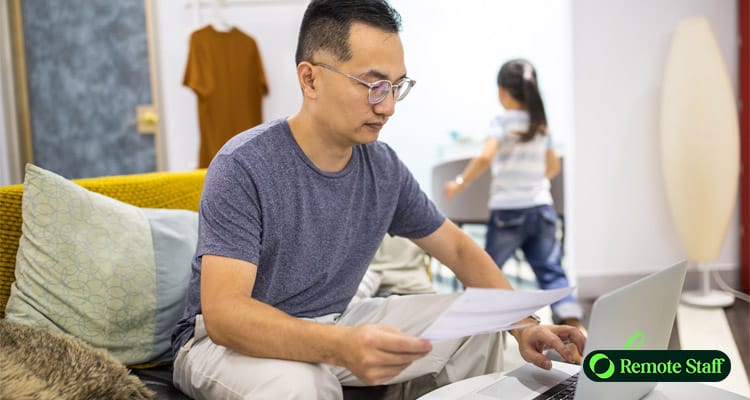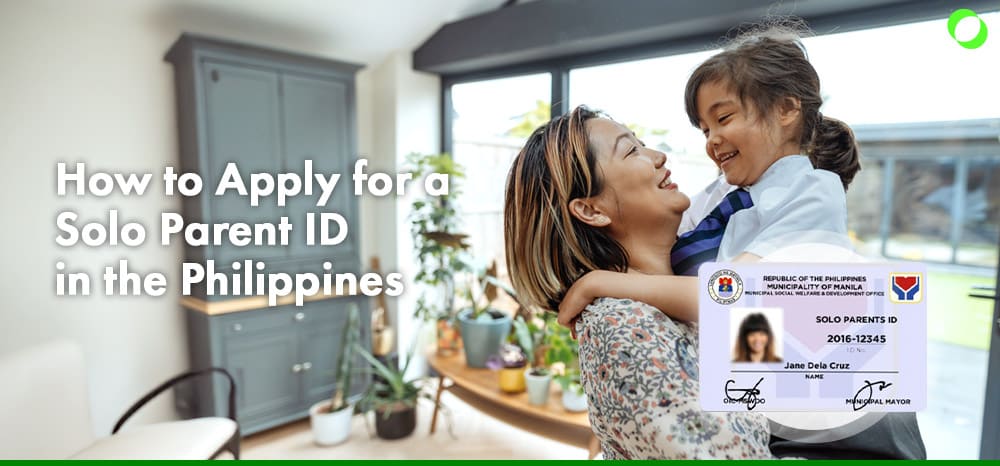Being a solo parent is a noble yet challenging calling, as you must constantly juggle raising your children and growing your career.
Fortunately, there’s help.
The Philippine government offers a powerful tool in the form of the solo parent ID (SPID).
Having one gives you access to solo parent-exclusive perks, like extra paid leaves on your traditional or remote job, financial assistance, educational support, and health benefits.
So, how do you get a solo parent ID? What exactly are its other benefits to solo parents? Where do you apply for one?
To answer all these questions, we’ve prepared a detailed solo parent ID registration guide to help you.
What is a Solo Parent ID and Why You Should Apply for One?
Let’s start by discussing what a solo parent ID is and its benefits.
Also known as the Solo Parent Identification Card, it is a government-issued ID from the Department of Social Welfare and Development (DSWD) and Local Government Units (LGUs) certifying that a parent is raising a child alone.
This ID entitles you to several benefits, as mandated by Republic Act (RA) 8972 (Solo Parents’ Welfare Act of 2000) and its expansion under RA 11861 (Expanded Solo Parents Welfare Act).
Under these laws, solo parents are entitled to the following benefits:
Parental Leave and Workplace Flexibility
- 7 Days of additional paid leave for solo parents annually, after at least one year of service.
- Employers are legally required to provide flexible working arrangements (i.e., telecommute positions) and are prohibited from discriminating against you due to your solo parent status.
Health and Financial Support
- PhilHealth coverage automatically includes you and your children.
- PHP 1,000 monthly financial assistance for low-income solo parents.
Discounts and Exemptions
- A 10% discount on essential baby items and VAT exemption if your annual income is below PHP 250,000,
Educational and Lifelong Benefits
- Priority access to scholarships (through DepED, CHED, and TESDA) and public services like low-cost housing.
- Book allowances, transport subsidies, and VAT-free school supplies for you and your children – from basic to tertiary education.
- Access to skills training, livelihood programs, and other socio-economic support initiatives.
A solo parent ID is valid for one year from the date of issuance, and renewal is free and can be done at your local City/Municipal Social Welfare Office.

Who Qualifies as a Solo Parent Under RA 11861?
RA 11861 defines solo parents as follows:
- A parent providing sole care and support to a child or children, regardless of marital status,
- Spouses or family members caring for children of low/semi-skilled OFWs who have been working continuously abroad for at least 12 months,
- Unmarried mothers or fathers who have chosen to raise their child alone,
- Legal guardians, adoptive or foster parents who are solely responsible for the child,
- Relatives within the 4th degree of kinship (consanguinity or affinity) who assume full parental care/support due to the death, abandonment, disappearance, or absence of the child’s parents for at least 6 months,
- Pregnant women who are solely caring for their unborn child, and
- A parent whose child was born as a consequence of rape, even without final conviction of the offender.
Income Level and Documentation for Subsidy Eligibility
On the other hand, the income threshold for subsidy eligibility for solo parents is as follows:
- Must have income at or below the poverty threshold, which is based on NEDA/PSA metrics and evaluated by your local government unit,
- Defined as minimum wage earners or below, with dependencies considered when living costs are evaluated,
- Must not be receiving other government cash aid (i.e., 4Ps), although being a senior citizen or PWD doesn’t disqualify you, and
- There is no income restriction for non-cash benefits (PhilHealth, discounts, and solo parent leave).
When applying for the PHP 1,000 subsidy, bring the following documents:
-
- Proof of Income:
- Income Tax Returns (ITRs) or BIR Form 2316 for employed single parents,
- Payslips or employment certification showing monthly earnings,
- Certificate of No Income or Indigency for unemployed single parents, and
- Affidavit of Indigency if informal documents are needed.
- Residency Proof:
- Barangay certificate stating you’ve lived in the LGU for at least six months.
- Proof of Income:
- Your Solo Parent ID, and
- Social Worker Assessment.
Required Documents for Solo Parent ID Application
To begin your application for a solo parent ID, you’ll need the following documents:
- Barangay Certificate of Residency:
- Proof that you’ve lived in your barangay for at least 6 months.
- PSA Birth Certificate(s) of Dependent Child(ren):
- Have an original and a photocopy version.
- Proof of Solo Parent Status (Varies by Category):
- If due to the death of your spouse: PSA Death Certificate.
- If spouse was detained/incapacitated: Detention certificate or medical abstract.
- If you’re separated/divorced/nullified: Court decree or affidavit.
- If unmarried: Certificate of No Marriage (CENOMAR) and sworn solo parent affidavit.
- Pregnant solo parent: Medical record of pregnancy and affidavit.
- Proof of Income or Financial Status:
- Latest Income Tax Return (ITR) for employed/self-employed, or Certificate of Non-Filing / Barangay Treasurer Certification / Affidavit of Indigency if unemployed.
- Solo Parent Orientation Certificate:
- Certificate proving your attendance at an orientation seminar.
- Application Form and Valid ID:
- A filled solo parent ID application form from your LGU/DSWD and at least one valid government-issued ID (UMID, Passport).
- 1×1 or 2×2 Colored ID Photos:
- 2 photos are typically required.
Where to Apply for a Solo Parent ID
Once you have the requirements for your solo parent ID application, your next stop is your local City/Municipal Social Welfare and Development Office (C/MSWDO), often located within the Mayor’s office.
Some LGUs, like Caloocan City and Quezon City, allow for online solo parent ID applications, making it much more convenient.
Additionally, on some occasions, the DSWD hosts caravans in LGUs, where you can apply or renew your ID alongside accessing related services like SSS, PhilHealth, Pag-IBIG, and NBI.

Step-by-Step Guide to Applying
Let’s now take a look at the application steps to getting a solo parent ID:
Step 1: Prepare Your Documents
Start by gathering all the requirements for a solo parent ID application mentioned above.
Have both the original and photocopies of each document ready, as government staff need the former to confirm the latter’s authenticity.
When possible, prioritize getting your barangay and solo parent affidavits first, as they often take an additional 1-3 days of processing time to process- particularly if you live in larger or more urban areas.
Additionally, subsidiary documents like court decrees, medical abstracts, detention certificates, and contracts must be certified and notarized before submission.
Step 2: Visit Your City Social Welfare Development Office or Municipal Social Welfare Development Office (CSWDO or MSWDO)
Once you’ve gathered, photocopied, and certified/notarized all your documents, it’s time to head to your local C/MSWDO to submit them.
Upon reaching the office, inform the staff at the reception or desk that you’re applying for a solo parent ID. A social worker will then verify all your documents and log your case into the Solo Parent Registry and provide a case or reference number.
Step 3: Interview or Assessment (If Necessary)
During your application, your assigned social worker will conduct a brief interview (often 10-15 minutes) to confirm:
- Your solo-parent situation,
- Household composition, and
- Income/poverty status.
In some LGUs, this interview may include a home visit or contact with collateral references to verify your living and caregiving situation.
Additionally, before your LGU issues your solo parent ID, you’re legally required to attend an orientation seminar explaining:
- Your rights, benefits, and obligations as a solo parent (i.e., parental leave, subsidies, discounts, scholarships, etc.), and
- Who qualifies for the benefits under the law, and how to access these benefits.
This orientation can take place within a group or administered individually, depending on your LGU’s arrangements.
Once completed, you’ll receive a Certificate of Attendance, which is essential for the issuance of your ID.
Step 4: Wait for Approval and Claim Your Solo Parent ID
After completing the application process, your local C/MSWDO or DSWD office will begin processing your request.
Typically, applications are processed within 30 working days from the date of application. However, some LGUs like Muntinlupa City and Victorias City, Negros Occidental may issue an ID within 7 working days.
When it’s ready, you’ll get a notification to pick it up. Bring your reference/case number or any receipt issued, and present a valid photo ID to verify your identity.
Step 5: Use the ID to Access Your Benefits
Now that you have your solo parent ID, you can use it to access the various benefits entitled to you by RA 11861.
These include submitting your ID with your leave request to access paid parental leave or to enroll in PhilHealth coverage and social support services.
In addition, you can use your ID when purchasing baby goods and when applying for housing, scholarships, or training.
Finally, for single parents who are earning equal to or less than minimum wage, you can register your ID to get a PHP 1,000 monthly subsidy.
Frequently Asked Questions About the Solo Parent ID
Here are some of the most commonly asked questions applicants ask when applying for a solo parent ID.
How Long Does a Solo Parent ID Last?
A solo parent ID is valid for 1 year from the date of issuance, and must be renewed annually to maintain access to the benefits provided under the law.
The renewal process for a solo parent ID involves returning to the same C/MSWDO and submitting certain documents again – which are typically your ID, updated income, or residency proofs – and attending any required orientations before renewal is approved.
Can I Still Apply Even if I’m Employed?
Of course you can!
In fact, employed single parents enjoy more benefits from this ID in the form of parental leaves, PhilHealth coverage, and access to scholarships and training.
What if I’m Separated but Not Legally?
Yes, you still qualify as a solo parent under RA 11861 – so long as you can prove your de facto separation and sole parental responsibility via the following:
- Child’s PSA birth certificate,
- Marriage certificate or an affidavit stating that you’re married but separated,
- Two (2) affidavits from disinterested persons confirming the separation,
- Barangay or police certificate confirming the separation event or situation,
- Your own sworn affidavit confirming you have sole parental care and do not cohabit with your spouse or partner, and
- A barangay official’s affidavit confirming your residency and caregiving role.
Can I Use the Same ID in a Different City?
Yes, you can use your solo parent ID anywhere for nationally applicable benefits like PhilHealth membership, parental leave, and discounts.
However, for LGU-administered benefits like the monthly subsidy or local housing programs, the card is only recognized by the LGU that issued it.
Thus, if you move to a different area permanently, you’ll need to reapply in your new LGU.
To do so, start by obtaining a clearance or endorsement from your former barangay confirming your usage of the benefits there.
Next, go to your new LGU’s C/MSWDO and present your clearance, residency proof, and ID.
Finally, they may ask you to apply anew or simply revalidate your existing ID under their jurisdiction.
Can Men Apply for a Solo Parent ID?
Absolutely.
The law is inclusive of any parent or caregiver, regardless of gender, who is the sole provider of care and support to a child or children.

A Solo Parent ID is Your Gateway to Government Support
Obtaining a solo parent ID gives you access to much-needed support for yourself and your family.
The best part? Applying for one is very straightforward. Simply meet the requirements and follow the steps outlined above, and you’ll have it within a month.
That said, not many Filipino single parents know about this ID nor the benefits it provides.
Thus, one way you can help is by sharing what you’ve learned here and inviting other single parents to apply for one too.
Aside from an ID, having a stable job, particularly one offering virtual career opportunities, is crucial for ensuring your family’s financial stability.
Enter Remote Staff.
Our jobs list contains plenty of work-from-home openings to choose from, ranging from virtual assistant jobs and online transcription jobs to online writing and design jobs.
Ready to start finding remote-first job opportunities? Sign up here. Good luck!

